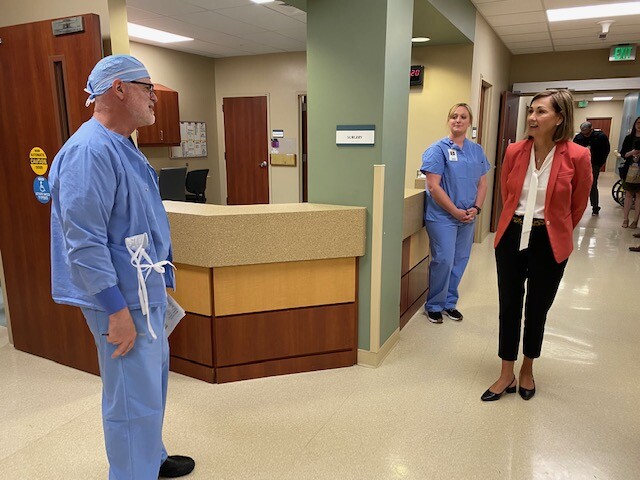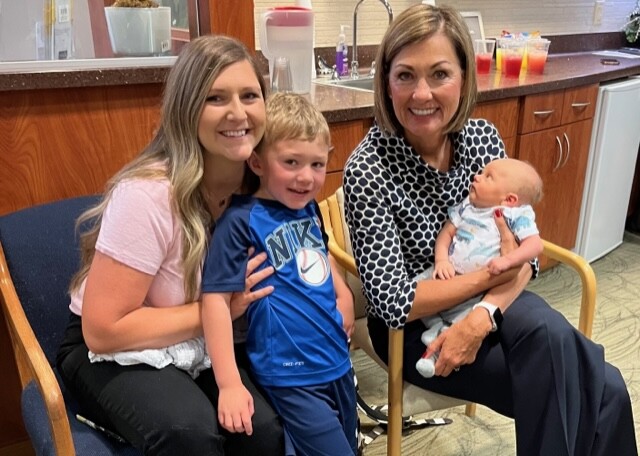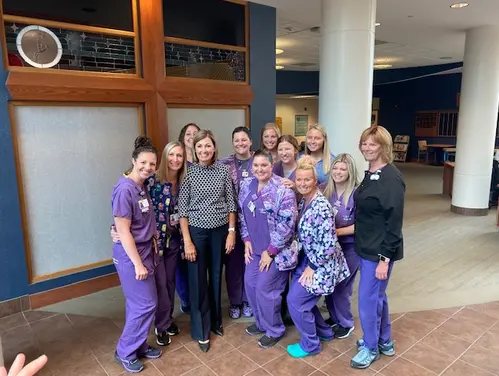Supporting the Health and Well-being of Iowans
Since taking office, Governor Reynolds has made health care access a key priority of her administration. Working alongside stakeholders, she has developed policy solutions that have strengthened the foundation of Iowa’s health care system and expanded access to care for more Iowans.
With a strong foundation on which to build, the state can focus on ensuring the right care is available at the right time and place to meet the unique needs of Iowans. That means creating better alignment of state programs and funding, and building strong connections with community-based providers and partners. Together, we can make a positive impact on the health, well-being, and lives of Iowans.
Gov. Reynolds proposes:
- Establishing Thrive Iowa, a program to immediately connect Iowans in need to resources, followed by ongoing support while they work to achieve self-sustainability and long-term independence.
- Aligning Iowa’s MHDS regions to improve services and outcomes.
- Investing Iowa’s opioid settlement funds in drug prevention, treatment and recovery.
- Extending postpartum Medicaid coverage to 12 months.
- Providing paid paternal leave for state employees.
- Improving access to hormonal contraceptives.
- Protecting minors from online pornography.
Thrive Iowa
Across the state, countless faith-based and non-profit organizations stand ready to provide goods and support to Iowans in need. Yet too often, those who need immediate assistance don’t know where to turn for help. Without a way to connect them to the resources they need, they can too easily fall through the cracks.
Thrive Iowa, a new resource through the Department of Health and Human Services (HHS), will create a network of navigators to help at-risk individuals find immediate support from community organizations, then follow them over time helping them develop an individualized plan for self-sufficiency and long-term independence.
- Implement an online system that facilitates the participation of churches, non-profits, and businesses.
- Establish a network of navigators to work with program participants.
Establish a primary entry point for Iowans in need of help or referring organizations to engage with a navigator.
Behavioral Health System Alignment
Iowa has made significant progress improving and expanding its mental health system in recent years. Still, too many vulnerable Iowans get lost in its complexity.
Iowa’s 13 mental health and disability service (MHDS) regions are funded by the state but lack meaningful state oversight and are largely disconnected from the substance use disorder system. The result is duplicative programs, inefficient operations, and poor outcomes. Iowans deserve an aligned system that enables coordination of services and delivers the best outcome for every person.
- Create a newly aligned behavioral health system that includes both mental health and substance use disorder services. HHS will contract with a lead agency in each district to deliver services.
- Move disability services from the regions to the HHS Aging and Disability Network.
- Districts will have advisory boards to maintain a strong local connection.
- The state will implement performance measures and define district boundaries as well as required core services.
Opioid Settlement Investment
Iowa’s share of opioid settlement funds would be best used to support drug prevention, treatment and recovery of Iowans impacted by the ongoing epidemic.
- Invest $8 million to establish a recovery infrastructure grant program expanding recovery providers in Iowa.
- Invest $1.5 million to support individuals with scholarships or workforce training and employment opportunities.
- Invest $1 million to deploy peer support to emergency rooms so people have someone who’s been in their shoes to help with recovery.
- Invest $3 million for youth substance use treatment and behavioral health.

Postpartum Medicaid Coverage
Support healthy outcomes for new moms and their babies by extending postpartum Medicaid coverage from 60 days to 12 months.
- Provide 12 months of continuous postpartum Medicaid coverage for new moms at 215% of federal poverty level (FPL) and below.

Paid Parental Leave
Currently, state employees utilize the Family Medical Leave Act (FMLA) to take unpaid time off following the birth or adoption of a child. As an additional benefit to better support our workforce and their families, paid maternity and paternity leave are proposed.
- Provide four weeks paid maternity leave for mothers and one week paid paternity leave for fathers.
- Provide four weeks paid leave for parents adopting a child.
Over-the-Counter Contraceptives
Barriers to access can prevent the regular use of birth control. Expanding access to over-the-counter contraceptives helps prevent unintended pregnancies.
- Allow pharmacists to dispense self-administered hormonal contraceptives to patients 18 years and older without a prescription.
Internet Safety for Minors
It’s estimated that up to 90% of U.S. youth between the ages of 12 to 18 have access to the internet. A recent study by Common Sense Media found that 54% of teens are exposed to online pornography before the age of 13. Pornographic content has exploded online, and children should be protected from it.
- Allow the Attorney General to seek and enforce civil penalties against pornographic websites that do not require visitors to complete an age verification process before entering the site and engaging with content.
- Websites are prohibited from retaining any personal or identifiable information gathered through the age verification process.
- Websites are liable for damages if sites do not perform age verification and if identifying information is retained during the verification process.
